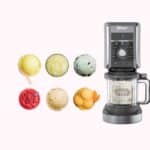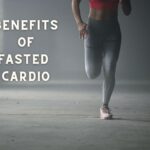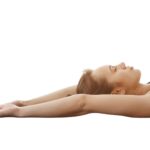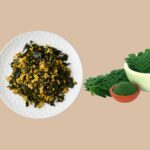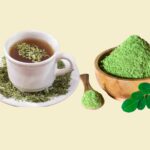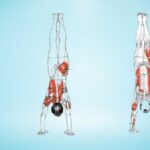As we grow older, nourishing our bodies with the right ingredients becomes more important than ever.
No one can’t undermine that sauces can make any dish extraordinary and we always want to add extra flavor to our meals to elevate our taste buds with the perfect combination.
However, it is more important to ensure that health should never be compromised for good taste, but unfortunately, our taste buds influence our decisions most of the time.
If you’re over 40, you might want to think twice before reaching for that bottle of the high-fat sauces as it might be delicious but can be problematic to consume over 40, causing an increased risk of heart disease, diabetes and high blood pressure.
Studies have shown that increased rates of obesity and high blood pressure among people aged between 35 to 64 are putting them at risk for heart disease, and around half of the total population of the United States has at least three out of one risk factors – high blood pressure, high cholesterol, and smoking for heart disease.
In this article, we’ll reveal the 9 high-fat sauces you should avoid after 40 to stay healthy and in good shape and suggest some healthier alternatives that won’t compromise your taste buds.
Professionals review our articles to ensure the accuracy of the content.
9 High-Fat Sauces need to be avoided to eat over 40
1. Cheese Sauces

The presence of high calories, saturated fats, and sodium can be detrimental, especially for individuals over 40, even though cheese sauce is a good source of calcium and protein.
Containing 72% fat, 19% carbs, and 9% protein 1, most of the fat in Cheese sauces is saturated fat and consuming too much saturated fat can increase the risk of heart disease and other health problems.2
In addition, a tablespoon of cheese sauce contains around 104 milligrams of sodium, which can also cause high blood pressure and the risk of heart and other health problems.
In its report, the Dietary Guidelines Advisory Committee (DGAC) advises maintaining fat intake not beyond 35 percent of daily calories and saturated fat up to 10 percent of total calories.
Similarly, Sarah Reuven, MS, CDN, founder of Rooted Wellness, says high sodium and saturated fat can elevate blood pressure and bad cholesterol.
Although Cheese Sauces can add flavor to certain dishes, they must be consumed in moderation, especially for individuals over 40.
2. Tartar sauce

Tartar sauce is a condiment that can be enjoyed with various dishes, such as fish and chips, sandwiches, and salads. Belonging to a mayonnaise food category and made with mayonnaise, pickles, capers, lemon juice, and herbs, tartar sauce contains high calorie and fat content.
A typical serving size of tartar sauce (2 tablespoons or 30g) contains around 5 % of saturated fat, 63 calories and around 200 milligrams of sodium, which is about 9% of the daily recommended intake. 3 4
High sodium and saturated fat can lead to heart disease, stroke, and other health problems, especially for individuals over 40 with existing health issues. 5
3. Peanut sauce

Peanut sauce – a favorite among food enthusiasts made with ground peanuts, soy sauce and a blend of other seasonings – is a mouthwatering indulgence.
However, it’s important to be cautious of overconsumption as its high-calorie and fat content may lead to undesired weight gain.
While it adds a lip-smacking flavor to your meals, it’s worth noting that this sauce can be problematic for individuals over 40.
A typical serving size of peanut sauce (2 tablespoons or 32g) contains around 4 % of saturated fat, 82 calories and around 428 milligrams of sodium, which is about 19% of the daily recommended intake.6
Peanut sauce may contain added sugars, such as honey or brown sugar. Consuming too much-added sugar may cause obesity, type 2 diabetes, and other health problems.7
Similarly, overconsumption of sodium and saturated fat may lead to health problems, including heart disease.
4. Barbecue sauce

Barbecue sauce is a must in many households, especially during summer when grilling becomes popular. Despite its savory and delicious taste, it’s essential to note that barbecue sauce may have some side effects on our health.
As a sauce connoisseur, you may be shocked to learn that even the most popular sauces can pack a caloric punch.
A mere two-tablespoon serving can range anywhere from 45 to 70 calories! But that’s not the worst part. Some sauces contain a staggering 8 to 12 grams of sugar per serving. It also contains 350 milligrams of sodium, which could be 14 percent of your daily recommended intake. 9
Unfortunately, many sauce brands skimp on healthy ingredients and opt for highly processed additives, like high-fructose corn syrup and caramel coloring.
Look for brands that use natural ingredients and eschew preservatives like potassium sorbate and sodium benzoate.
5. Teriyaki Sauce

Teriyaki sauce is a mouthwatering addition commonly found in various delicious Japanese dishes. This delectable sauce recipe is skillfully crafted using soy sauce, sugar, and a well-balanced blend of other ingredients that will tantalize your taste buds.
While teriyaki sauce can enhance any dish’s flavor, it’s important to be mindful of its potential drawbacks, particularly for those over 40. Sugar levels in teriyaki sauce can be a concern, and folks should be wary of overindulging in this flavor-packed condiment.
A typical serving size of teriyaki sauce (2 tablespoons) contains around 5-10 grams of sugar, most of which is added sugar. Consuming too much-added sugar can increase the risk of obesity, type 2 diabetes, and other health problems, especially for individuals over 40.
Another potential issue with teriyaki sauce is its high sodium content. A 2-tablespoon serving of teriyaki sauce contains around 600-1000 milligrams of sodium, about 25-35% of the recommended intake. 10
High sodium intake can increase blood pressure, which may cause heart disease, stroke, and other health problems.
Related Article: 25 Practical Ways To Reduce Your Sugar Intake
6. White Sauce or Gravy Sauce

Gravy sauce – a universally beloved sauce that instantly enhances the flavors of meat, potatoes, and other dishes. No dinner party or Thanksgiving feast is complete without it.
However, did you know that this delicious sauce can also be high in calories, fat, and sodium, posing significant health risks, especially for individuals over 40?
If you’re one of those who love their gravy, don’t worry – we’re not asking you to give it up entirely. Instead, it’s important to be mindful and consume it in moderation. This way, you can savor each forkful without worrying about its adverse health consequences.
A typical serving size of gravy sauce (1/4 cup) contains around 84 calories, of which 63 percent come from fat. Consuming too many calories can increase the risk of obesity, a risk factor for many health problems, including heart disease, diabetes, and certain types of cancer.
Another potential issue with gravy sauce is its high-fat content. A 1/4 cup serving of gravy sauce can contain around 3-5 grams of saturated fat, around 15 percent of the total daily recommended intake. Consuming too much-saturated fat can lead to heart disease and other health problems.
It may also be high in sodium. The same amount of gravy sauce can contain around 200 milligrams of sodium, about 9% of the recommended intake. 11 12 High sodium intake can increase blood pressure that may cause heart disease, stroke, and other health problems.
7. Hollandaise Sauce

Hollandaise sauce is a delectable sauce that adds a buttery richness to your favorite dishes. It has egg yolks, rich butter, and tangy lemon juice. While it makes for a mouthwatering addition to dishes like eggs benedict, it’s worth noting that it can be quite calorie-rich, high in fat, and can raise cholesterol levels.
A typical serving size of Hollandaise sauce (2 tablespoons) contains around 160-180 calories, of which 97% come from fat; hence its high consumption can increase the risk of obesity, which is a risk factor for many health problems, including heart disease, diabetes, and certain types of cancer.
Hollandaise sauce has a high-fat content. A 2-tablespoons serving of Hollandaise sauce can contain around 18-22 grams of fat, of which 11 grams is saturated fat, which is around 55 percent of the total recommended daily intake.
Similarly, the same amount of Hollandaise sauce contains around 145 milligrams of cholesterol, which is about 48-50% of the daily recommended intake. 13
Hollandaise sauce contains high cholesterol and fat that can cause health problems, including heart disease.
8. Béarnaise Sauce

Béarnaise sauce is a tantalizingly creamy topping that accentuates the flavors of steak, chicken, and vegetables.
The sauce is a mélange of egg yolks, butter, shallots, tarragon, and vinegar, making it a delectable treat for your taste buds.
However, it’s crucial to note that it may only suit some. Individuals over the age of 40 must be cautious as the sauce comes with a high quotient of calories, fat, and cholesterol, which can impact your health.
A typical serving size of Béarnaise sauce (1/4 cup) contains around 180-220 calories, of which 93% come from fat.
Similarly, a 1/4 cup serving of Béarnaise sauce can contain around 18-22 grams of fat, of which 14% is saturated fat.
Béarnaise sauce may also contain 120 milligrams of cholesterol, about 40% of the recommended intake.14 High cholesterol and saturated fat intake can lead to health problems, including heart disease.
9. Alfredo Sauce
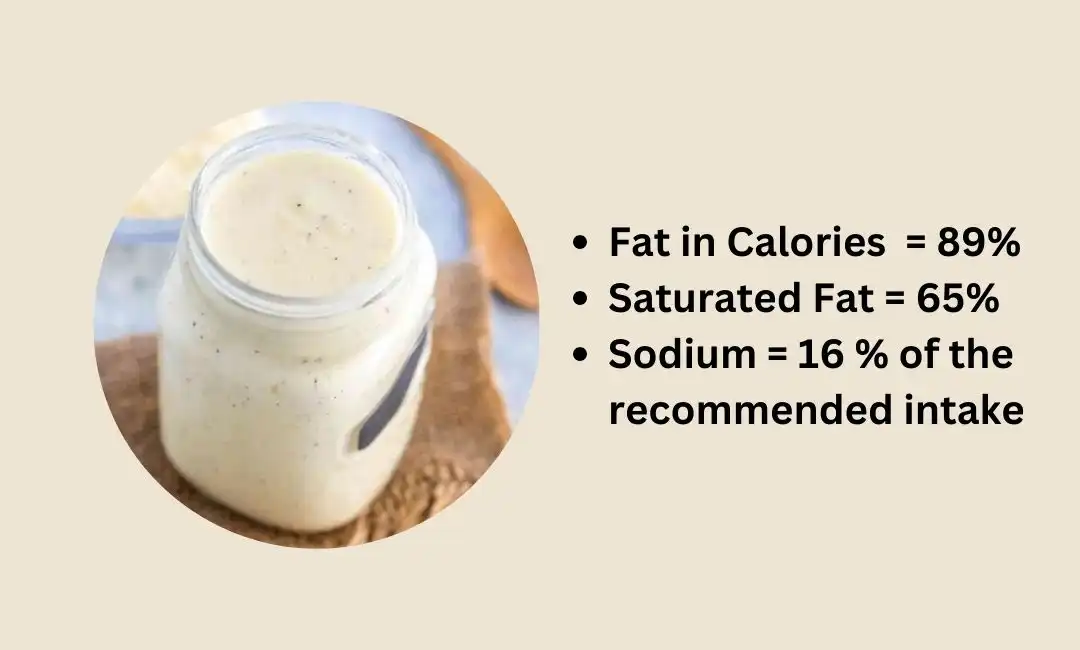
Alfredo sauce is a delightful addition to your pasta dishes. However, it’s no secret that this guilty pleasure is not friendly to your waistline. High calorie, fat, and sodium content can pose health risks.
A typical serving size of Alfredo sauce (1/4 cup) contains around 100-120 calories, of which 89% come from fat.
Similarly, a 1/4 cup serving of Alfredo sauce can contain around 10 grams of fat, of which 65% is saturated fat. It also contains around 360 milligrams of sodium, about 16% of the recommended intake.
High sodium and saturated fat intake can increase the risk of high blood pressure, a risk factor for heart disease and stroke. 15
A Word from Blogzah
Sauces can make or break your health after 40. While they can enhance the flavor and enjoyment of your food, they can also be high in fat, calories, and sodium that can harm your heart, blood pressure, blood sugar, and weight.
To stay healthy and fit after 40, you should avoid or limit these 9 high-fat sauces. If it is difficult to avoid these sauces, then go for lower-fat and lower-sodium options like vinaigrettes made with olive oil, salsa, hummus, pesto, etc., or making homemade sauces with healthier ingredients can be a better alternative.



